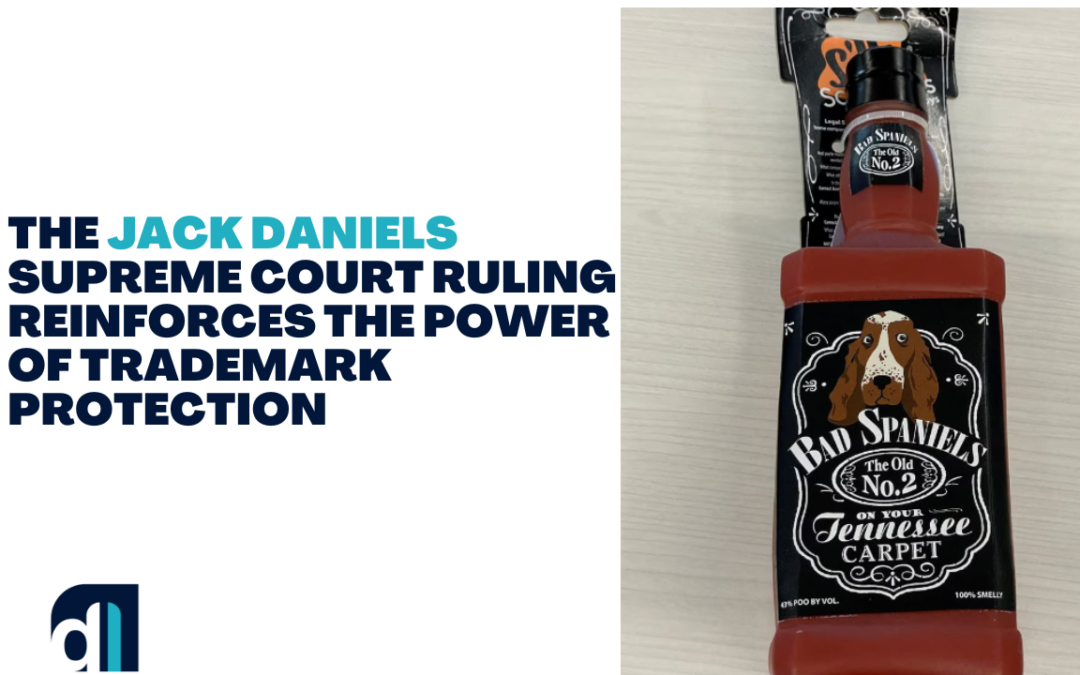The Jack Daniels v. Bad Spaniels saga has finally ended, and the Supreme Court decision has re-emphasized the importance of robust trademark protection for brands. It reminds us that as trademark owners, our duty doesn’t stop at registration but extends to constant vigilance in brand enforcement.
In the digital landscape, brand identity, and trademarks are integral to business success, and the U.S. Supreme Court recently issued a ruling that significantly bolsters the power of brand owners. So, the dispute was between whiskey maker Jack Daniels, and VIP Products LLC, and the Supreme Court sided unanimously with Jack Daniels. Let’s talk about why.
In this case, VIP Products created a dog toy called “Bad Spaniels,” which was eerily similar to the distinctive Jack Daniel’s bottle, and they claimed that its parody product fell under the protection of free speech provided by the First Amendment. However, the Supreme Court disagreed, affirming that a parody must do more than merely mimic the original for humorous effect to garner such protection.
One of the driving factors behind the ruling was the potential for consumer confusion. While the product was a dog toy, its resemblance to the Jack Daniels’ bottle could lead consumers to mistakenly believe that Jack Daniel’s produced or endorsed the toy. This introduces the risk of dilution and damage to the brand image, and as the Court noted, humor does not offer immunity from trademark infringement.
So, What Does this Mean for Brand Owners?
The implications are far-reaching. This decision reaffirms that trademark protection is not limited to defending against similar goods or services. It extends to anything that could potentially cause consumer confusion, parody or not.
This underlines the importance of vigilance in brand enforcement. Brand owners should continually monitor their market for potential infringements, including any products, communications, or parodies that could mislead consumers regarding the brand’s origin or endorsement.
In today’s digital era, where memes and parodies are integral to online culture, this ruling sends a clear message. The court’s decision emphasizes that brand owners are not required to tolerate unauthorized use of their trademarks, even when masked as parody.
Brand owners, therefore, are empowered with more tools to protect their trademarks from misuse or dilution, ensuring the integrity and value of the brand in the marketplace. Brand owners must remain proactive in safeguarding their trademarks, maintaining the credibility and distinctiveness that underpin the brand’s success.
The Importance of Trademark Registration and Post-Registration Protection
While the first step towards securing your brand’s identity is filing a thorough trademark application, the responsibility of brand enforcement continues beyond there. Post-registration protection is equally essential.
Registering a trademark legally protects your brand, making it easier for you to take action against anyone who attempts to use it without permission. But remember, the registration is just the beginning of the journey. The real task is consistent monitoring and enforcement to ensure your trademark rights are not violated.
At Drishti Law, we specialize in navigating the complexities of brand protection. I can guide you through the nuances of brand enforcement and development, providing tailored advice to your brand’s unique needs. Contact us for more information or to discuss your brand protection strategy.

Sahil Malhotra
Sahil Malhotra is an Intellectual Property Attorney, who founded Drishti (“vision”) law because of his vision in protecting dreams and ideas.
He provided individuals and small businesses with an opportunity to enhance their IP’s value by helping them register trademarks and successfully argue against office actions. In addition to his training and experience, he has been deeply involved in the multifaceted IP portfolio at UIC and continues to be associated with IP organizations and conferences.
To know more about Sahil Malhotra — Click Here
You may follow Sahil Malhotra on Facebook: Sahil Malhotra and on Instagram: @Sahil Malhotra

